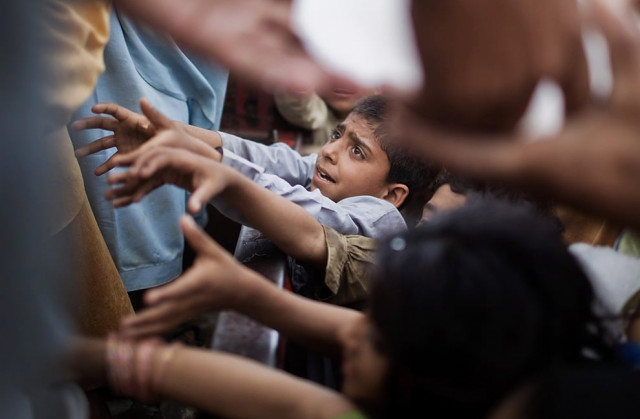As 2015 passes, progress on MDGs remains dismal
Pakistan lags behind in poverty eradication, ensuring primary education

PHOTO: REUTERS
Named as the Millennium Development Goals (MDGs) – or now Sustainable Development Goals (SDGs) – this uphill task was also taken up by the Pakistani government.
The MDGs are eight goals that many countries had agreed with the United Nations to achieve by the end of 2015. These eight goals are further divided into 21 targets, of which Pakistan agreed to work on only 16. However, the country’s progress on these 16 targets is again a dismal tiding.
Eight goals on which Pakistan agreed to work include eradicating extreme hunger and poverty, improving maternal health, achieving universal primary education, combating HIV/AIDS, malaria and other diseases, promoting gender equality and empowering women, enduring environmental sustainability, reducing child mortality and developing a global partnership for development.
Shortcomings
Pakistan lags behind in many aspects of the agreed upon tasks. The list starts from extreme poverty which is not even close to being completely eradicated from the country.
According to the United Nations Development Programme (UNDP) site, Pakistan is on track to achieve the targets on nine indicators, whereas its progress on 24 indicators is off track.

If we look at the roots of poverty, we may understand why the country has failed to achieve the targets. In Sindh and Punjab, there are still millions of bonded labour slaves who toil in scorching heat and excruciating working conditions because they are indebted to the feudal lords.
Although the Bonded Labour Abolition Act 1992 prohibits enslavement, little attention is paid to this grave issue.
Also in this matter, the figures collected by authorities at the helm of UNDP reflect that, “one of the indicators where situation has really worsened in the past four years is the proportion of population below the minimum level of dietary energy consumption which stood at 58% in 2010-11, owing to two-digit inflation (and even higher food inflation) over the last four years which has significantly decreased the purchasing power of the poor.” This has amplified the plight of the country.
The other major goal authorities have failed to achieve is the proper access to primary education.
The government’s interest in making this goal a reality can easily be gauged from the glitch in a law which describes that a child would not receive education from the state beyond 16 years of age, neither can he work until he is 18 years old.
Article 25-A states that any child under 16 cannot work and should be given primary education. However contradicting its own law, the government fails to clarify what the child is meant to do between 16 and 18. Where should a poor child spend his two years? Our law fails to define that.
Pakistan had said that it would reach a literacy rate of 88% working on the MDGs but it would only be able to achieve 58% by the end of 2015.
The third goal was to achieve gender equality something which Pakistan seems to be really working on despite fundamentalists trying otherwise. Pakistan has achieved the highest ratios of women in parliament in the South Asian region, according to the data available with the UN.
Muzammal Afzal from NGO Manzil believes that as long as MDGs are there, people who are affiliated with the bodies working to achieve these goals will only fill their pockets and maintain the status quo.
He is of the opinion that the agreed upon goals were not achieved by 2015 because they were too ambitious and were an absolutely uphill task for a poor country like Pakistan.
The writer is a staff correspondent
Published in The Express Tribune, January 11th, 2016.
Like Business on Facebook, follow @TribuneBiz on Twitter to stay informed and join in the conversation.



















COMMENTS
Comments are moderated and generally will be posted if they are on-topic and not abusive.
For more information, please see our Comments FAQ